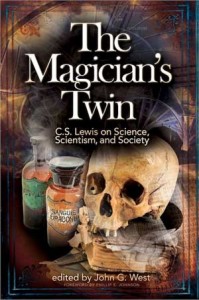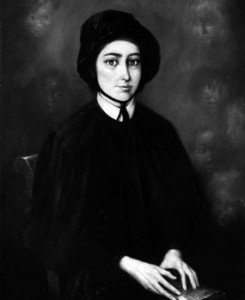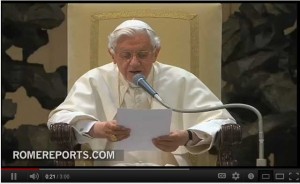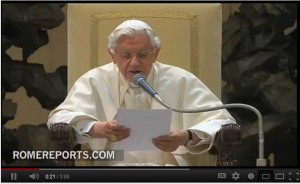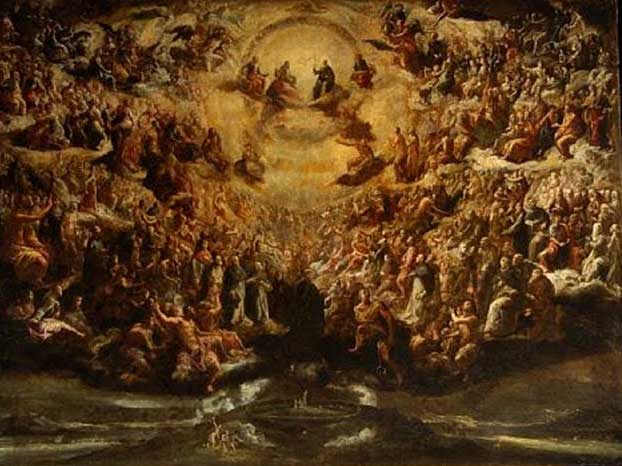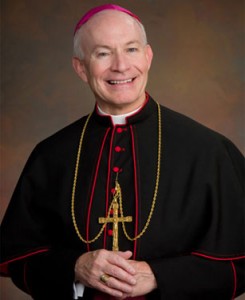 Archbishop Lucas begins a  video series on the Sacrament of Penance
Archbishop Lucas begins a  video series on the Sacrament of Penance
Be sure to check out more from the Archbishop on this sacrament  at  USCCA19 – The United States Catholic Catechism for Adults with Archbishop George Lucas – Chap. 18 Sacrament of Penance and Reconciliation – God is Rich in Mercy
Tags: Archbishop Lucas, sacrament
This entry was posted on Wednesday, February 6th, 2013 at 10:38 am
You can follow any responses to this entry through the RSS 2.0 feed.
 Archbishop Lucas begins a  video series on the Sacrament of Penance
Archbishop Lucas begins a  video series on the Sacrament of Penance
Be sure to check out more from the Archbishop on this sacrament  at  USCCA19 – The United States Catholic Catechism for Adults with Archbishop George Lucas – Chap. 18 Sacrament of Penance and Reconciliation – God is Rich in Mercy
Tags: Archbishop George Lucas, Archbishop Lucas, sacrament
This entry was posted on Tuesday, February 5th, 2013 at 5:24 pm
You can follow any responses to this entry through the RSS 2.0 feed.
“The Magician’s Twin: C.S. Lewis and the Case against Scientism” is fascinating. Â I love discussing anything surrounding the thought of C. S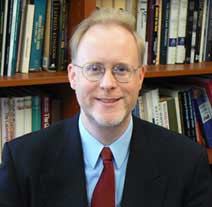 . Lewis, and this particular conversation with John West, Â brought great insight on Lewis’ thought about the dangers of “scientism”. Â This extensive book offers warnings by the beloved writer concerning the influence of unleashed science and its various fields and it’s potentially troubling effect on mankind. Â A wonderfully engaging read…don’t miss.
. Lewis, and this particular conversation with John West, Â brought great insight on Lewis’ thought about the dangers of “scientism”. Â This extensive book offers warnings by the beloved writer concerning the influence of unleashed science and its various fields and it’s potentially troubling effect on mankind. Â A wonderfully engaging read…don’t miss.
[powerpress]
You can find the book here
Here is the link to the site that is dedicated to the book: Â C.S. Lewis Web
From the book description:
Beloved for his Narnian tales and books of Christian apologetics, bestselling British writer C. S. Lewis also was a perceptive critic of the growing power of scientism, the misguided effort to apply science to areas outside its proper bounds. In this wide-ranging book of essays, contemporary writers probe Lewis’s prophetic warnings about the dehumanizing impact of scientism on ethics, politics, faith, reason, and science itself. Issues explored include Lewis’s views on bioethics, eugenics, evolution, intelligent design, and what he called “scientocracy.†Contributors include Michael Aeschliman, Victor Reppert, Jay Richards, and C. John Collins.
Tags: catholic, catholic podcast, catholic prayer
This entry was posted on Wednesday, January 30th, 2013 at 12:53 pm
You can follow any responses to this entry through the RSS 2.0 feed.
This extraordinary Eucharistic hymn, by the great St. Thomas Aquinas, is a fan favourite among the faithful. This version regretably leaves out the second verse. The recording is from the CD illuminations, compiled by Dan Gibson. the Latin text and English translation follow:
| Latin text | An English translation | |
|---|---|---|
|
|
Tags: Dan Gibson, faith, last supper, st thomas aquinas, thomas aquinas
This entry was posted on Monday, January 28th, 2013 at 9:54 am
You can follow any responses to this entry through the RSS 2.0 feed.
(The following wonderful reflection on the life of St. Elzabeth Ann Seton is from Fr. Mark Kirby which can be found on his website  Vultus Christi ….I highly encourage you to check it out!!!
which can be found on his website  Vultus Christi ….I highly encourage you to check it out!!!
Dom Mark Daniel Kirby is Prior of the Diocesan Benedictine Monastery of Our Lady of the Cenacle in Tulsa, Oklahoma.His Excellency Bishop Edward J. Slattery of the Roman Catholic Diocese of Tulsa established the monastery in 2009 with the distinctive mission of Eucharistic Adoration for the sanctification of priests.)
William Magee Seton gave this lithograph of Christ the Redeemer to his beloved wife, Elizabeth Ann Seton, sometime between 1774 and 1803. Its Eucharistic theme prophetically reflected the profound devotion to the Most Holy Eucharist that would characterize her piety as a Catholic.
Below is a photograph of a copy of a variant of the Memorare handwritten by Elizabeth Ann Seton. At the end of text she added the touching plea, “Love me, my Mother.
The Italian Experience
The conversion of Elizabeth Ann Bayley Seton began in 1803 while she, a twenty-nine year old widow with one of her five children, were the guests of the Filicchi family in Livorno, or Leghorn, Italy. The Catholic Filicchis, Antonio and his wife Amabilia, offered her a gracious hospitality and unfailing emotional support in a time of crisis.
The Motherhood of the Blessed Virgin
In one of Signora Filicchi’s prayer books, Mrs. Seton came upon the text of Saint Bernard’s Memorare; she found in the Virgin Mary the tenderness and the pity of a mother. “That night,” she writes, “I cried myself to sleep in her heart.”
The Tabernacle
The Filicchi home contained a private chapel where the Blessed Sacrament was reserved. Elizabeth was drawn to the tabernacle. Even before her mind had been instructed in the mysteries of the Catholic faith, her heart recognized the living presence of the Lord in the Most Holy Eucharist. Her American Protestant sensibility was perplexed and, yet, she could not deny her heart’s fascination with the Lamb of God hidden beneath the sacramental veils.
Return to New York
Elizabeth’s long personal memoir, The Italian Journal, recounts the intimate details of her inner struggle and conversion to Catholicism. Elizabeth and her ten year old daughter, Anna Maria, returned to New York on June 3, 1804, accompanied by Antonio Filicchi — a man to whom Elizabeth had become deeply attached. He had become for her a friend and a spiritual counselor. (more…)
Tags: American Catholics, daughters of charity, elizabeth ann seton, fr. mark daniel kirby, Real Presence, spiritual journey
This entry was posted on Friday, January 4th, 2013 at 12:21 am
You can follow any responses to this entry through the RSS 2.0 feed.
VATICAN CITY, 16 FEB 2011 (VIS) – In his general audience today, held in the Paul VI Hall, the Pope focused his attention on St. John of the Cross, “spiritual friend to St. Teresa and, with her, reformer of the Carmelite religious family. Proclaimed a Doctor of the Church by Pius XI in 1926, he is traditionally known as the ‘Doctor mysticus’, the Mystical Doctor”, the Holy Father said.
John was born to a poor family at Fontiveros near the Spanish town of Avila in 1542 and entered the Carmelite order at Medina del Campo. Ordained a priest in 1567, it was on the occasion of his first Mass that he met Teresa, “who explained to him her plan for the reform of the Carmelites”. In his renewal of his religious profession John took the name “of the Cross” and collaborated enthusiastically in the process of reform, something “which brought him great suffering”, and even led to his imprisonment following an unjust accusation. While preparing a journey to Mexico he fell seriously ill and died in December 1591. He was beatified by Clement X in
1675 and canonised by Benedict XIII in 1726.
St. John of the Cross, said Benedict XVI, “is considered one of most important lyric poets of Spanish literature. He wrote four major works: ‘Ascent of Mount Carmel’, ‘Dark Night of the Soul‘, ‘Spiritual Canticle’ and ‘Living Flame of Love‘.
“In his ‘Spiritual Canticle’ St. John outlines the soul’s journey of purification”, the Holy Father added. “The ‘Living Flame of Love’ continues in the same line, describing in greater detail the condition of union with God. … ‘Ascent of Mount Carmel’ outlines the spiritual itinerary from the point of view of a progressive purification of the soul, which is necessary in order to scale the heights of Christian perfection, symbolised by the summit of Mount Carmel”.
The Pope continued his catechesis by explaining how “the ‘Dark Night of the Soul’ describes the ‘passive’ aspect; in other words, God’s contribution to the process of purifying the soul. Human effort alone, in fact, is incapable of reaching the deepest roots of a person’s bad inclinations and habits. It can halt them but not eradicate them completely. To do this, we need a special action by God which radically purifies the spirit and disposes it to the union of love with Him“.
“The rate of increase of faith, hope and charity goes hand in hand with the work of purification and with progressive union with God, until attaining transformation into Him. When this goal is reached, the soul is immersed in Trinitarian life itself. … This is why the Mystical Doctor held that there is no true union of love with God that does not culminate in Trinitarian union”.
The Pope completed his remarks by asking whether the life of St. John of the Cross has anything to say to everyday Christians, or whether it is an example only for the few select souls who can follow the path of purification and mystical ascesis. “The journey with Christ, travelling with Christ … is not an additional weight to the already sufficiently-heavy burden of our lives”, he said. “It is something totally different. … It is a light, a power which helps us carry our everyday burden. … Allowing ourselves to be loved by Christ is the light which helps us to carry the daily burden, and sanctity is not a task we must accomplish on our own, a very difficult task. … Let us ask God to help us become saints, to allow ourselves to be loved by God, which is the vocation and true redemption of us all”.
Published by VIS – Holy See Press Office – Wednesday, February 16, 2011
Tags: ascent of mount carmel, carmelite order, carmelites, dark night of the soul, doctor of the church, family, heart, holy father, hope, love, Mystical Doctor, purification of the soul, spanish literature, spiritual friend, st. john of the cross, union with god
This entry was posted on Friday, December 14th, 2012 at 12:19 am
You can follow any responses to this entry through the RSS 2.0 feed.
“I am a nobody, I am a small rope, a tiny ladder, the tail end, a leaf.â€Â – Saint Juan Diego
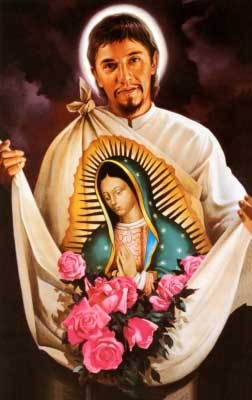
CNA – Born in 1474 in Cuauhtitlán, Mexico, to an Aztec tribe given the name Cuauhtlatoatzin, or “talking eagle.†He belonged to the poorest and most numerous class of the Aztecs, besides that of the slaves. He worked the land and wove mats for a living, and was married although he and his wife had no children.
He converted to Christianity in 1524 and was baptized along with his wife and took the name Juan Diego. He had already been of a mystical character before his baptism, spending long periods of time alone in contemplation.
In 1531, two years after the death of his wife, Maria Lucia, Juan Diego began receiving the famous apparitions of Our Lady of Guadalupe, patron of the Americas, who spoke to him in his native tongue, Nahuatl, and imprinted an image of Herself on his tilma – a poor indian’s cape, and instructed him to have the bishop build a church on the site of the apparition – now the Basilica of Our Lady of Guadalupe, the most visited church in the world, after Saint Peter’s in Rome.
Our Lady of Guadalupe, with Juan Diego’s cooperation, is said to be directly responsible for the 9 million or so conversions to Catholicism by the native Mexican only 20 years after Christianity was introduced to the land by the Spanish.
He died on May 30, 1548 and was canonized by Pope John Paul II in Mexico City on July 31, 2002 – CNA
Tags: apparition, apparitions of our lady, basilica of our lady of guadalupe, bishop, death, juan diego, Maria Lucia, mexico city, saint juan diego
This entry was posted on Sunday, December 9th, 2012 at 1:42 am
You can follow any responses to this entry through the RSS 2.0 feed.
The Immaculate Conception Room, located in the heart of the Vatican Museums, regained its glory in 2007, after an extensive restoration. Now, just years later, the spotlight returns for the publication of an spectacular book about its frescoes.
Tags: frescoes, heart, immaculate conception, vatican, vatican museum, Vatican Museums
This entry was posted on Saturday, December 8th, 2012 at 12:34 am
You can follow any responses to this entry through the RSS 2.0 feed.
“Remember always…a tranquil conscience and an assured innocence produce a blessed life”
blessed life”
Saint Ambrose (c. between 337 and 340 – 4 April 397), was a bishop of Milan who became one of the most influential Church figures of the 4th century. Mariologist, heresy buster, emperor tamer, lover of hymns, an answer to a mother’s prayer (ask St. Monica), you name it, St. Ambrose fills the bill…
Did you know that St. Ambrose was one of the first recorded instances of someone reading silently? Interesting…
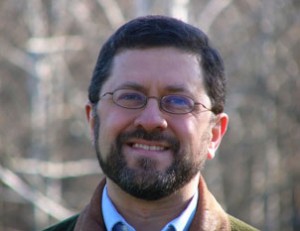 Did you know that he received, essentially, the sacramental Grand Slam all at once? Wonder what that is?
Did you know that he received, essentially, the sacramental Grand Slam all at once? Wonder what that is?
…well let’s ask Mike Aquilina. Take a listen [powerpress]
For a fuller a rendering of his life, visit New Advent
So, so much from St. Ambrose! First, better to hear from the man himself (sort of…)
On Holy Mary
Next on Holy Repentance
A prayer of St. Ambrose
Lord Jesus Christ, I approach your banquet table in fear and trembling, for I am a sinner, and dare not rely on my own worth but only on your goodness and mercy. I am defiled by many sins in body and soul, and by my unguarded thoughts and words.
Gracious God of majesty and awe, I seek your protection, I look for your healing. Poor troubled sinner that I am, I appeal to You, the fountain of all mercy. I cannot bear your judgment, but I trust in your salvation. Lord, I show my wounds to You and uncover my shame before You. I know my sins are many and great, and they will fill me with fear, but I hope in Your Mercies, for they cannot be numbered.
Lord Jesus Christ, eternal king, God and man, crucified for mankind, look upon me with mercy and hear my prayer, for I trust in You. Have mercy on me, full of sorrow and sin, for the depth of your compassion never ends.
Praise to You, saving sacrifice, offered on the wood of the cross for me and for all mankind. Praise to the noble and precious blood, flowing from the wounds of my crucified Lord Jesus Christ and washing away the sins of the whole world. Remember, Lord, your creature, whom You have redeemed with Your Blood. I repent my sins, and I long to put right what I have done. Merciful Father, take away all my offenses and sins; purify me in body and soul, and make me worthy to taste the holy of holies.
May Your Body and Blood, which I intend to receive, although I am unworthy, be for me the remission of my sins, the washing away of my guilt, the end of my evil thoughts, and the rebirth of my better instincts. May it incite meto do the works pleasing to You and profitable to my health in body andsoul, and be a firm defense against the wiles of my enemies.
Tags: Church, conscience, doctors of the church, father of the church, fathers mike, mercy, mike aquilina, Saint Ambrose, st ambrose, st. paul center for biblical theology
This entry was posted on Friday, December 7th, 2012 at 12:21 am
You can follow any responses to this entry through the RSS 2.0 feed.
“How do we speak to God in our times? How can we communicate the Gospel to open the way to its salvific truth?” The Holy Father offered an answer to these questions in his catechesis during today’s general audience, held in the Vatican’s Paul VI Hall.
“In Jesus of Nazareth”, the Pope said, “we encounter the face of God, descended from Heaven to immerse Himself in the world of mankind and to teach ‘the art of living’, the road to happiness; to free us from sin and to make us true children of God”.
He continued, “speaking about God means, first and foremost, being clear about what we must bring to the men and women of our time. God has spoken to us, … not an abstract or hypothetical God, but a real God, a God Who exists, Who entered history and remains present in history: the God of Jesus Christ … as a response to the fundamental question of why and how to live. Therefore, speaking about God requires a continual growth in faith, familiarity with Jesus and His Gospel, a profound knowledge of God and strong passion for His plan for salvation, without giving in to the temptations of success. … We must not fear the humility of taking small steps, trusting in the leaven that makes the dough rise slowly and mysteriously. In speaking about God, in the work of evangelisation under the guidance of the Holy Spirit, we must return to the simplicity and essential nature of proclamation: the concrete Good News of God Who cares about us, the love of God which Jesus Christ brought close to us, even unto the Cross, and which in the Resurrection opens us to life without end, to eternal life”.
The Pope explained that for St. Paul, communicating the faith did not mean “showing himself, but rather saying openly and publicly what he had seen and heard in his encounter with Christ, and how much his life had been transformed by that encounter. … The Apostle was not satisfied with merely proclaiming the words, but committed his entire existence to the great work of faith. … To speak about God, we must make space for Him, confident that He acts upon our weakness. We must make space for Him without fear, with simplicity and joy, in the profound conviction that the more we place Him – and not ourselves – at the centre of our lives, the more fruitful our communication will be. … This also holds true for Christian communities. They are called to communicate the transforming action of God’s grace, overcoming individualism, closure, selfishness and indifference, bringing the love of God to daily relationships. We must must act to ensure … we always announce Christ, not ourselves”.
“At this point”, the Holy Father continued, we must ask ourselves “how Jesus Christ Himself communicated. Jesus … spoke about His Father (Whom He called ‘Abba’) and about the Kingdom of God, looking with compassion on the discomforts and difficulties of human existence. … From the Gospel we see how Jesus was interested in every human situation He encountered, He immersed Himself in the lives of the men and women of His time, with complete trust in the help of the Father. … In Him, proclamation and life were entwined: Jesus acted and taught, always taking as a starting point His intimate relationship with God the Father. This approach gives fundamental indications to Christians: living in faith and charity is a way of speaking about God in our times, because it demonstrates the credibility of what we say in words through a life lived in Christ. We must take care to grasp the signs of our times, and thereby to identify the potential, the desires and the obstacles we encounter in contemporary culture, in particular the desire for authenticity, the yearning for transcendence, the sensibility for protecting creation. And we must communicate without fear the answer offered by faith in God”.“Speaking about God, therefore, means enabling others to understand through words and acts that God is not a competitor in our existence but rather its true guarantor, the guarantor of the greatness of the human person. Thus we return to the beginning: speaking about God means communicating, with power and simplicity, through words and the life we lead, that which is essential: the God of Jesus Christ, the God Who showed us a love so great that He took on human flesh, died and rose again for us; the God Who asks us to follow Him and to allow ourselves to be transformed by His immense love in order to renew our lives and our relationships; the God Who gave us the Church, to allow us to journey together and, through the Word and the Sacraments, to renew the entire City of Man so that it might become the City of God”, concluded the Pope.
Tags: children, God Who, jesus christ, love
This entry was posted on Wednesday, November 28th, 2012 at 9:05 am
You can follow any responses to this entry through the RSS 2.0 feed.
Below a Vatican Radio translation of the Holy Father’s general audience catechesis
Dear Brothers and Sisters,
Last Wednesday we reflected on the desire for God that the human being carries deeply within himself. Today I would like to continue and deepen this aspect meditating briefly on some paths to knowing God, remembering, however, that God’s initiative always precedes any action of man, and even in the journey towards Him, it is He who first enlightens us, guides us and leads us, always respecting our freedom. And it is always He who allows us enter into his intimacy, revealing and gifting Himself us the grace to be able to welcome this revelation in faith. Let us never forget the experience of St. Augustine: it is not we who seek or possess the Truth, but the Truth that seeks us out and posses us.
However, there are paths that can open the human heart to knowledge of God’, there are signs that lead to Him. Of course, often we are in danger of being dazzled by the glitter of worldliness, which make us less able to travel these paths or to read those signs. However, God does not tire to look for us, He is faithful to the humanity He created and redeemed, He remains close to our lives, because He loves us. And ‘this a certainty that must accompany us each and every day, even if certain widespread mentalities make it increasingly difficult for the Church and the Christian to communicate the joy of the Gospel to all creatures and all lead to an encounter with Jesus, the one Saviour of the world. This, however, is our mission, the mission of the Church and every believer must live it joyfully, feeling it to be his or her own, through a life truly animated by faith, marked by charity, service to God and to others, and capable of radiating hope. This mission shines above all in the holiness to which all are called.
Today difficulties and trials are not lacking for the faith, often poorly understood, challenged, rejected. St. Peter said to his Christians: “Always be ready to respond, but with gentleness and respect, to anyone who asks you for the hope that is in your hearts” (1 Pt 3:15). In the past, in the West, in a society that is considered Christian, faith was the environment in which we moved; the reference and adhesion to God were, for most people, part of everyday life. Rather, it was those who do not believe that had to justify their disbelief. In our world, the situation has changed and, increasingly, the believer must be able to account for the reasons of his faith. Blessed John Paul II, in the Encyclical Fides et Ratio, emphasized how faith is put to the test in these times, crossed by subtle and insidious forms of theoretical and practical atheism (cf. nn. 46-47). From the Enlightenment onwards, the criticism of religion has intensified, history has also been marked by the presence of atheistic systems, in which God was considered a mere projection of the human mind, an illusion, and the product of a society already distorted by alienation. The last century has seen a strong and growing secularism, in the name of the absolute autonomy of man, considered as a measure and artifice of reality, but depleted of his being created “in the image and likeness of God.” In our time there is a particularly dangerous phenomenon for the faith: there is in fact a form of atheism that we define, as ‘practical’, which does not deny the truths of faith or religious rituals, but simply considers them irrelevant to everyday existence, detached from life, useless. Often, then, people believe in God in a superficial way, but live “as if God did not exist” (etsi Deus non daretur). In the end, however, this way of life is even more destructive, because it leads to indifference towards faith and the question of God
Tags: beauty, faith, freedom, truth
This entry was posted on Wednesday, November 14th, 2012 at 12:22 pm
You can follow any responses to this entry through the RSS 2.0 feed.
 Blessed John Duns Scotus, the teacher of “God’s closeness”. I love the homily below on this great theologian and lover of the Blessed Mother.Â
Blessed John Duns Scotus, the teacher of “God’s closeness”. I love the homily below on this great theologian and lover of the Blessed Mother.Â
CNA- Pope Benedict XVI taught about Franciscan priest and teacher Blessed John Duns Scotus, in one of his Wednesday audiences in July of 2010.  The Holy Father remembered his loyalty and devotion to Christ, the Church and the Successor of St. Peter, as well as his contributions to Christian thought.
During his catechesis, the Pope recalled the life of the medieval Scottish priest and theologian, Blessed John Duns Scotus. He spoke of how the Franciscan, who taught at Oxford, Cambridge, and later in Paris, left France instead of betraying Pope Boniface VIII who was in conflict with King Phillip IV.
This fact, said the Pope, “invites us to remember how many times in the history of the Church, believers have found hostility and promptly even persecution because of their loyalty and devotion to Christ, to the Church and to the Pope.
“We all look with admiration to these Christians, that teach us to protect as a precious inheritance the faith in Christ and the communion with the Successor of Peter and, therefore, with the Universal Church.”
Continuing on the life of the 13th century Franciscan, the Pope said that Blessed Scotus provided three major contributions to Christian thought. The first gift is his “great Christocentric vision” that in the Incarnation “every creature, in and through Christ, is called to be perfected in grace and to glorify God forever.” The second contribution is the theory which led to the dogma “that Our Lady’s preservation from original sin was a privilege granted in view of her Son’s redemptive passion and death.” And finally, Pope Benedict noted his “great attention to the issue of human freedom”as one of his gifts to Christian thought. (more…)
Tags: blessed john duns scotus, blessed mother, Church, death, franciscan priest, homily, love, medieval theologian, pope benedict xvi, theologian
This entry was posted on Thursday, November 8th, 2012 at 4:04 am
You can follow any responses to this entry through the RSS 2.0 feed.
(Vati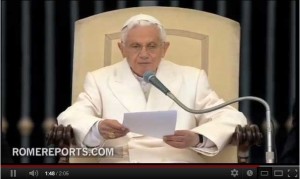 can Radio) What really satisfies man’s deepest desire? Is the desire for God absurd, irrational in today’s secularised world? How do we reach out to people who have lost their faith? To people who do not believe in God? How do we accompany them on their search for true good? These were the questions Pope Benedict XVI posed to 30 thousand people in St Peter’s Square for the Wednesday general audience, the third in his series for the Year of Faith.
can Radio) What really satisfies man’s deepest desire? Is the desire for God absurd, irrational in today’s secularised world? How do we reach out to people who have lost their faith? To people who do not believe in God? How do we accompany them on their search for true good? These were the questions Pope Benedict XVI posed to 30 thousand people in St Peter’s Square for the Wednesday general audience, the third in his series for the Year of Faith.
Listen:[powerpress]
The answer, Pope Benedict XVI said, lies in rediscovering the real meaning of human desire, ecstasy and love. In rediscovering our taste for the joys of life.
“We must believe that even in our era, seemingly reluctant to the transcendent dimension, that it is possible to open a path toward an authentic religious meaning of life, showing how the gift of faith is not absurd, it is not irrationalâ€
Below please find a Vatican Radio translation of Pope Benedict XVI’s general Audience catechesis, the third in his series on the Year of Faith:
Dear brothers and sisters,
The journey of reflection that we are making together this Year of Faith leads us to meditate today on a fascinating aspect of the Human and Christian experience: man carries within himself a mysterious desire for God. In a very significant way, the Catechism of the Catholic Church opens with the following consideration: “The desire for God is written in the human heart, because man is created by God and for God; and God never ceases to draw man to himself. Only in God will he find the truth and happiness he never stops searching for”(No. 27).
Such a statement, which even today in many cultural contexts seems quite acceptable, almost obvious, might instead appear as a provocation in the sphere of secularized Western culture. Many of our contemporaries could, in fact, argue that they do not feel such a desire for God at all. For large sectors of society He is no longer desired, expected, but rather a reality that leaves some indifferent and not even worth wasting one’s breath over. Actually, what we have defined as “desire for God†has not completely disappeared and still today, in many ways, appears in the heart of man. Human desire always tends towards certain tangible assets, which are often far from spiritual, and yet it is still faced with the question of what “the†good really is and as a result confront itself with something other than itself, something that man cannot create, but is called upon to recognize. What can really satisfy man’s desire?In my first encyclical, Deus caritas est, I tried to analyze how such dynamism is experienced in human love, an experience which in our era is more easily perceived as a moment of ecstasy, of going beyond oneself, as a place where man senses that he is being filled with a desire that is beyond him. Through love, men and women experience in a new way, thanks to one another, the grandeur and beauty of life and of reality. If what I experience is not a mere illusion, if I really want the good of the other as a path towards my own good, then I must be willing to de-centralize myself, to put myself at the service of the other to the point of surrendering myself. The answer to the question about the meaning of the experience of love thus passes through the cleansing and healing of the will, which is required by the very good we want for the other. We have to practise, train and even correct ourselves so that that good may be truly wanted. (more…)
Tags: pope benedict xvi, year of faith
This entry was posted on Wednesday, November 7th, 2012 at 2:17 pm
You can follow any responses to this entry through the RSS 2.0 feed.
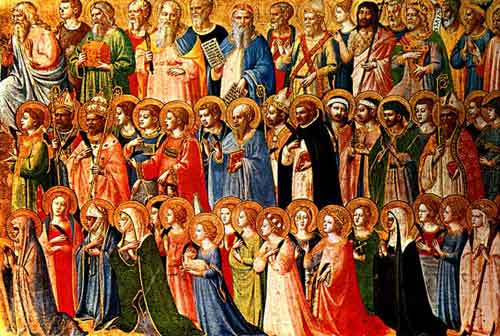 OOOOOOOh Yea ….!!!
OOOOOOOh Yea ….!!!
Tags: saints
This entry was posted on Thursday, November 1st, 2012 at 12:09 am
You can follow any responses to this entry through the RSS 2.0 feed.
Tags: all saints, litany of saints, prayer
This entry was posted on Thursday, November 1st, 2012 at 12:08 am
You can follow any responses to this entry through the RSS 2.0 feed.

